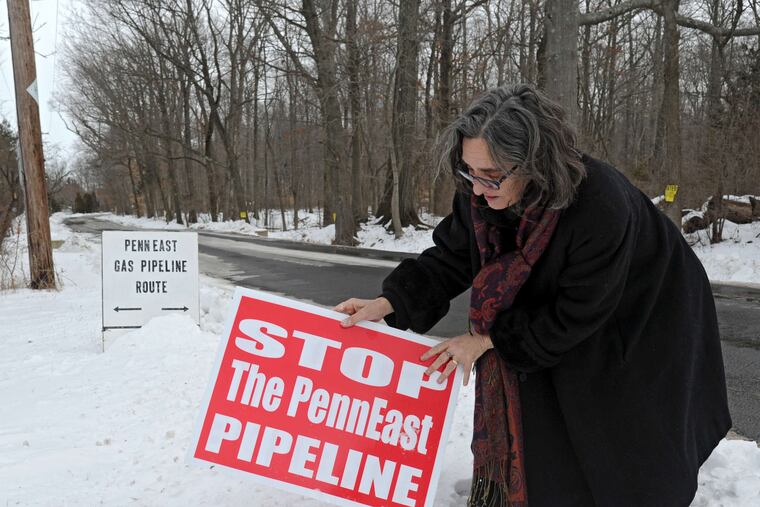N.J. power company can’t truly go green and hang onto controversial pipeline | Opinion
It was newsworthy when South Jersey Industries announced a plan to eventually eliminate its greenhouse gas emissions. But there's a hitch.

Last month, South Jersey Industries (SJI) — a utility company that serves 700,000 customers — announced that it plans to be carbon neutral by 2040. For proponents of clean energy like me, this should have been an exciting, encouraging development.
But there is a big fly in their clean energy ointment: the proposed PennEast gas pipeline.
Like other utility companies in New Jersey and across the nation, SJI knows that dirty fossil fuels are on the way out. Customers want safe, clean energy sources like wind and solar. Over the next several decades, those sources will replace natural gas and other fossil fuels.
So it was newsworthy when SJI announced a plan to reduce and eventually eliminate its emission of greenhouse gases that worsen the unsafe, unhealthy impacts of climate change.
» READ MORE: U.S. Supreme Court ponders the fate of a fracked natural gas pipeline to New Jersey
But the company’s ongoing financial support of the proposed PennEast pipeline undermines the worthy goal they are embracing.
PennEast is a proposed 120-mile natural gas pipeline to transport gas from fracking sites in Eastern Pennsylvania across the Delaware River through towns in Hunterdon and Mercer Counties in New Jersey. SJI has an ownership stake in the project — which could cost roughly $1 billion — and would also be a customer, buying gas from the pipeline to service its own customers.
The project would deliver a billion cubic feet of fracked gas daily, which proponents argue would serve millions of homes, create thousands of jobs, and lower energy bills for customers.
But according to the N.J. Rate Counsel, supply and demand requirements can be met through existing arrangements, even during extreme weather. In other words, PennEast is “a solution in search of a problem” — we don’t need an additional pipeline.
This project would also have detrimental impacts. According to a 2019 report by the Cadmus Group, prepared for the New Jersey Conservation Foundation, it would result in increased emissions of harmful greenhouse gas. The PennEast pipeline could also contaminate public water systems and wells, and disrupt acres of land, resulting in an estimated $43 million loss in ecosystem services. The construction will disturb wildlife and their habitats, including areas critical for many species of birds. A 2017 analysis by Key-Log Economics said the pipeline may also reduce property values by tens of millions of dollars.
» READ MORE: How many violations will be enough for Gov. Wolf to pull the plug on Mariner East? | Editorial
Residents from New Jersey municipalities in its path have spoken out opposing PennEast, backed up by elected officials from both parties. The state of New Jersey has blocked key easements on properties in which the state has an interest, including land preserved for conservation, agriculture, or recreation, which the PennEast Pipeline Co. LLC claims is illegal; the case has now reached the U.S. Supreme Court, which heard oral arguments from both sides last month.
By positioning itself as a carbon-neutral company while continuing to support the PennEast pipeline, SJI is essentially going to the store to buy a nicotine patch and a carton of cigarettes. Are you serious about quitting, or not?
SJI wouldn’t be the first company wanting to have it both ways by planting one foot in the future while keeping the other in the past, and seeking an environmentally sensitive public image in the process. When a company misleads the public about its environmental practices, it’s called “greenwashing.”
It would be a lot easier to give SJI credit if the company would “come clean,” literally and figuratively. It’s hypocritical to seek praise for environmental initiatives while seeking to build an unneeded fossil gas pipeline that would increase harmful emissions, potentially damage private and public lands, and threaten critical water and wildlife resources. As laudable as the goal of being carbon neutral by 2040 is, it’s inconsistent with building an environmentally destructive fossil fuel pipeline that would be in operation well beyond that date.
If SJI wants to be a good corporate citizen and as green as its public relations campaign touts, it will give up its interest in the PennEast pipeline.
Tom Gilbert is the campaign director for ReThink Energy NJ, a nonprofit organization that supports a swift transition to clean, efficient, renewable energy.